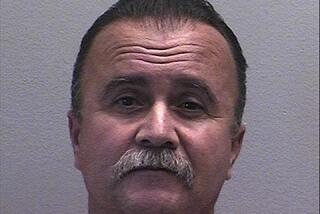‘Something Wasn’t Right,’ Tipster Says of Landlady : Led Police to Death House Suspect
- Share via
A disabled pensioner said today that he became suspicious of the friendly woman he met in a neighborhood bar in Los Angeles when she began questioning him about his Social Security benefits and then suggested that the two of them move in together.
“Something just didn’t seem right,” 67-year-old Charles Willgues recalled this morning. “I kept looking at the woman. I felt like I had seen her before.”
Willgues said he suddenly realized that where he had seen her was on a Channel 2 news broadcast earlier that day.
The woman he had been talking to was Dorothea Montalvo Puente, 59, who was suspected of murdering seven tenants at the Sacramento boarding house she managed, to collect their Social Security checks.
Willgues called the television station and met with CBS-TV assignment editor Gene Silver, and the two of them contacted Los Angeles police.
Quietly Arrested
Puente was arrested without a struggle at about 10:40 p.m. Wednesday at the Royal Viking Motel at Third and Alvarado streets, where she had checked in on Sunday, the day after investigators began uncovering the bodies in the back yard of the Victorian home she rented near the state Capitol.
Puente, dressed in a bright red coat, pink dress and burgundy shoes--the same clothes she was wearing when she disappeared last Saturday--was driven to Burbank Airport in handcuffs at 2:40 a.m. today and placed aboard a charter jet for a flight back to Sacramento.
Says She’s Innocent
During the flight, she declared her innocence in a brief interview with a television reporter:
“I have not killed anyone. The checks I cashed, yes. . . . I used to be a very good person at one time.”
Upon arrival at Sacramento’s Executive Airport, Puente was taken to police headquarters, questioned for about an hour and then booked at Sacramento County Jail on a charge of murdering Alvaro (Bert) Montoya, one of the missing tenants. Court records show that another tenant had told police that Puente told him to lie about Montoya’s disappearance.
A Sacramento Police spokesman, Sgt. Bob Burns, said that although only Montoya’s name is listed on the arrest warrant, Puente is expected to be charged eventually in the murders of all seven victims excavated from her yard.
Arraignment Set
Puente was scheduled for arraignment this afternoon in Sacramento Municipal Court.
Sacramento Police Chief Jack Kearns, whose officers drew criticism for allowing Puente to merely walk away and disappear without putting her under surveillance, told a press conference today that her arrest made him feel “very relieved.”
“Naturally, any time you have a killer on the loose, your fear is that person will kill again,” he said.
In an interview this morning with Associated Press, Willgues said he met Puente at the bar near the Los Angeles motel on Wednesday.
He said that at first, Puente had seemed “so nice and sincere--really believable,” telling him that she was a widow from San Francisco and had lost her luggage when a taxi drove off with it.
“She told me she needed her shoe fixed, and (asked) if I knew where she could get that done,” Willgues recalled. “That’s how our conversation got started.”
But Willgues said he started getting suspicious when Puente quizzed him about his Social Security benefits and then suggested that the two of them live together.
A few hours later, police surrounded the motel where Puente was staying.
“I knocked on the door and talked briefly to her,” Police Sgt. Paul von Lutzow said. “She didn’t say much. When I asked her for some ID, she went to her purse and got her drivers license. . . .”
The license identified the woman as Dorothea Puente Montalvo.
“She appeared to know we might be coming,” Von Lutzow said. “She didn’t put up a struggle or curse us or anything. Usually, when the police go into someone’s motel room, people get upset. But she showed no emotion, almost like she expected us. . . .
“She was real cool. She was real calm. She was not intimidated by police.”
Helped Her Unwittingly
In Sacramento, Homer Myers, 74, a former tenant of Puente’s, said Wednesday that he and others may have unknowingly helped her dispose of the bodies by digging makeshift graves.
He said she asked him to dig several holes in the back yard, one of them for an apricot tree.
“She said she had contacted a nursery and they told her she needed a hole that was four feet by four feet and five feet deep,” Myers said. “I thought that was a little deep. Now I know why.”
Myers said tenants occasionally disappeared, “but folks were always coming and going,” and no one seemed to pay much attention. On Wednesday, before Puente’s arrest, Sacramento Police Chief John Kearns acknowledged that his officers had committed a serious error by allowing her to disappear just hours after the first of the seven bodies were dug up in her back yard.
Although detectives Saturday did not have enough evidence to arrest Puente, Kearns said, “she should have been followed.”
“She should have been tailed very closely. She was a prime suspect in a homicide case. There isn’t any excuse as far as I am concerned why the suspect was not kept under surveillance,” Kearns said.
“It was a judgment call. The Sacramento Police Department made an error and as a result of that, we have lost the suspect,” he said.
Kearns, who had been in Los Angeles attending a California Police Chiefs Assn. conference when one of the most sensational murder stories in Sacramento history began unfolding late last week at the Victorian boarding house, defended his department’s decision not to arrest the boarding house proprietress, saying officers might have jeopardized their case if they had acted in haste.
“You’ve got to realize you’re walking on egg shells when talking to a suspect without an arrest warrant or a search warrant. She could have refused to allow the officers to dig in the yard,” he said.
The department has been criticized by local officials and neighbors for allowing the main suspect to slip away from the scene and walk unescorted to a nearby hotel, ostensibly to visit a nephew. The criticism intensified when affidavits filed in the case revealed that police knew the woman had a prison record and a propensity for lying.
A warning about Puente’s operation of the downtown rooming house was sounded last June when the Sacramento County Adult Protective Services office complained to the state Department of Social Services that she was running an unlicensed board-and-care facility and that she once had been sent to prison for misuse of client funds.
But Puente apparently was able to lie her way out of suspicion, persuading a state licensing inspector that only a cousin lived in the house and that she occasionally offered free temporary shelter to homeless people, according to a state licensing report. The state inspector concluded that the complaint that Puente was providing care and supervision without a license was unfounded.
At the time of the state inspector’s visit June 30, Alberto Montoya, a severly mentally ill man whom Puente since has been accused of murdering, was a tenant and under her care.
Court records obtained Wednesday show that Puente has a long history of criminal activity, arrests and convictions for a variety of offenses dating back to 1948.
Over time, each of her clashes with the law proved more serious and more violent than the last.
Yet she was able repeatedly to place herself into positions of trust despite her criminal record--working as a nurse’s aide and as a manager of board-and-care homes, with responsibility for elderly, mentally disturbed and physically disabled persons.
She “was known for her generosity and hospitality to those in need,” stated a Sacramento County probation report prepared for the court in 1982 when she was sentenced to five years in prison for doping a series of victims, stealing their cash and jewelry and forging signatures on their checks.
The same report reveals a troubled life and a seriously disturbed personality.
A psychiatrist who was treating her at the time of sentencing described her as a “schizophrenic, chronic undifferentiated type” and “a very disturbed woman.”
In recommending that she serve prison time, probation officials asserted that Puente “has demonstrated that she is a danger to elderly persons.”
Puente was born in California, the youngest of 18 children, she told probation officials who prepared the 1982 report. Both her parents were dead by the time she was 5, she told authorities; she was raised by her grandmother and an aunt in Fresno.
The records indicate that she was married at least four times--the first when she was 17.
By age 19, she was a widow and a convicted felon, found guilty of forging checks in Riverside.
In 1960, she served 90 days in Sacramento County Jail “for residing in a house of ill fame and received 90 days suspended for vagrancy,” the probation report said.
Eighteen years later after at least one other brush with the law, she was convicted in federal court for fraudulently endorsing “approximately 34 checks”--U.S. Treasury payments to residents in a board-and-care facility that Puente operated.
While on federal probation, she was again found guilty of forging checks, this time on state charges.
Boyer reported from Los Angeles; Ellis from Sacramento. Times staff writers Nieson Himmel, Maureen Fan and Tyler Chin in Los Angeles and Jerry Gillam, John Hurst and Paul Jacobs in Sacramento contributed to this article.
More to Read
Sign up for Essential California
The most important California stories and recommendations in your inbox every morning.
You may occasionally receive promotional content from the Los Angeles Times.













